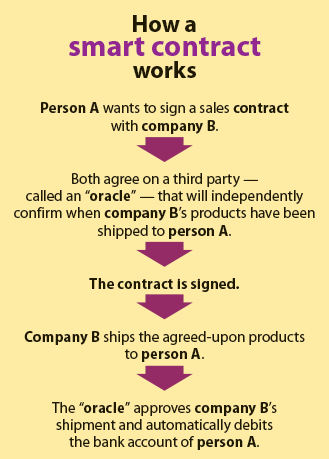Subscriber Benefit
As a subscriber you can listen to articles at work, in the car, or while you work out. Subscribe Now“Smart contracts” soon may change the way many lawyers practice.
The agreements are permanent, self-enforcing and certifiable. They require only that the parties agree upon a third-party — called an “oracle” — who collects external variable data. Once this oracle verifies information and confirms that the terms have been met, the contract executes automatically.
 Overmyer
Overmyer“‘Smart contract’ is a bit of a misnomer,” said Jeremy Overmyer, a member of Bingham Greenebaum Doll’s corporate services department and healthcare and insurance team. “The program can only carry out the function it was programmed to do and there is no reasoning or independent analysis.”
Though the idea of smart contracts was first proposed by computer scientist Nick Szabo almost 25 years ago, only recently has true potential of the format begun to be realized.
The most common current use for this legal tool is the related to the buying and selling of cryptocurrencies. However, its potential uses in other areas of legal practice is vast. Anything from supply chain agreements to crop insurance could use smart contracts, attorneys say.
Understanding the technology
To understand the possibilities of smart contracts, it helps to have a grasp of the underlying mechanics.
Blockchains are open, distributed ledgers in which transactions between parties can be easily verified. These records are permanent because each block contains a remnant of information, called a “hash,” of the one before it. Perhaps the most widely known blockchain is bitcoin.
“Bitcoin was developed as more of a cryptocurrency and payment system, so its use is much more limited,” said Overmyer.
Ethereum is the most popular blockchain for smart contracts because of its ability to be used as a virtual computer. Computer coding language is stored on the Ethereum blockchain, and the smart contracts work like a computer application within it.
 Merker
Merker“In short, it’s just a layer on top of the blockchain (used) to execute things automatically,” said Nick Merker, a partner at Ice Miller, where he is the co-chair of the firm’s data security and privacy practice.
But smart contracts come with both new opportunities and potential risks.
Security vulnerabilities
As with any mathematical equation, the accuracy of smart contracts depends on using correct information. This is where problems could conceivably arise.
“If someone were able to control both the application and the oracle, then the system would have little to no integrity,” said Overmyer.
Although the blockchain itself may be relatively safe from tampering, that doesn’t mean weaknesses do not exist.
“The whole purpose of smart contracts is so they’re irreversible,” said Merker. “If someone (exploits) a security vulnerability to fraudulently execute that smart contract, then whatever they’ve taken out of that is just gone.”
 Gorham
GorhamJeff Gorham is a senior associate at Frost Brown Todd, where he is a member of the blockchain and digital currency team. Gorham said, ideally, the oracle chosen for a smart contract would use multiple data points so that any obviously deceitful outliers could be routinely ignored.
“(Oracles) all have to be based on readily available and verifiable data,” he said.
Changing the industry
While smart contracts may be the labor-saving legal device of the future, the idea may leave attorneys rightfully wondering where they fit into this new landscape.
Merker said he compared the situation to 10 years ago when firms were still conducting document reviews in massive warehouses with paper documents. Likewise, he said that even though some classes of legal services would be consumed by this technology, new amenities would arise.
“I see it as an opportunity, but I’m sure not every attorney does,” he said.
 Frost Brown Todd attorney Matt Schantz works primarily with intellectual property matters, including patent and trademark applications and technology licenses. He said he foresees a new, but equally important, role for the know-how a lawyer can provide — even with a smart contract.
Frost Brown Todd attorney Matt Schantz works primarily with intellectual property matters, including patent and trademark applications and technology licenses. He said he foresees a new, but equally important, role for the know-how a lawyer can provide — even with a smart contract.
“It might not be as dramatic, but when horses on the roads gave way to cars, there were fewer jobs in the buggy whip industry, and more jobs in the tire and car assembly and engineering industry,” he said.
Gorham said he compares the coming change to the introduction of services such as LegalZoom. He said while self-serve clients can now quickly and cheaply set up LLCs with such programs, attorneys still have a place — even if they aren’t billing by the hour for the same services they used to.
“Lawyers are just going to have to adapt a little bit and still offer expertise,” he said. “I actually think that … there will be more opportunity for lawyers to get involved because we have to draw more clear boundaries and definitions. … You need to take more diligence on the front end to draft the smart contracts properly.”
Overmyer said he has heard similar fears of redundancy expressed regarding the use of artificial intelligence in the law. He said certain elements that rely on experience, humanity and critical thinking — such as indemnification, knowledge qualifiers and conflict resolution — would always be in demand.
“While the technology should prove valuable, lawyers aren’t going anywhere,” he said. “Smart contracts will most certainly help us deliver more efficient services to clients, but there will always be disputes as to intent and interpretation.”•
Please enable JavaScript to view this content.
